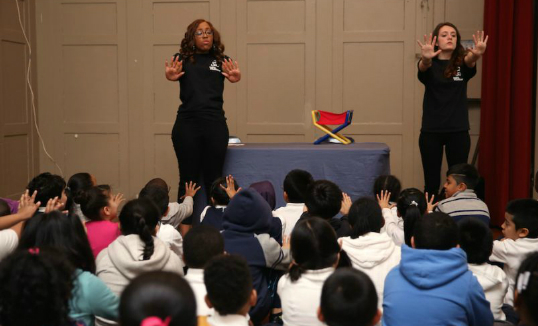Recognize, Resist and Report: An Interview with Marion White about CAPP
April is Child Abuse Prevention Month and The Foundling will be reporting on ways to recognize, resist, and report abuse and neglect all month long. Below is an exclusive interview with Marion White, Senior Program Director of The Foundling’s Child Abuse Prevention Program.
 Marion White, Senior Program Director of the Foundling’s Child Abuse Prevention Program
Marion White, Senior Program Director of the Foundling’s Child Abuse Prevention Program
Question: What is the Child Abuse Prevention Program (CAPP)?
Answer: Since 1986, the award-winning Child Abuse Prevention Program has taught more than half a million children to recognize, resist, and report abuse through our Child Safety Workshops for elementary school children across the five boroughs of New York City. In these one hour Workshops, we educate children on what abuse is and isn’t through the use of puppets. If a child has a problem with physical or sexual abuse, we provide them the opportunity to speak to one of our Prevention Specialists at the end of the presentation.
Question: What makes CAPP so special?
Answer: CAPP is special in two very important ways:
- We have two teams of CAPP Prevention Specialists each reaching 10,000 kids a year through our Workshops. They primarily educate third and fourth grade students by using life-size Kids on the Block puppets, which allow students to connect with the topics in a non-threatening way and remain engaged while learning about the serious subjects of physical and sexual abuse. The students are taught to recognize, resist, and report.
- At the end of each Workshop, students are invited to stay and talk with one of our Prevention Specialists or their Guidance Counselor/Social worker (who has attended CAPP’s full day professional training prior to the Workshop). At that time the children may ask questions or share experiences related to the program. We provide a smooth transition from the presentation to a one on one interview where a CAPP Prevention Specialist uses Minimal Facts Interview techniques.
Question: What is ‘Minimal Facts Interviewing’?
Answer: During a Minimal Facts Interview the CAPP Prevention Specialist asks who, what, when, and where—but not why. Asking ‘why’ could infer blame. Prevention Specialists also do not ask leading questions to avoid compromising the child’s statements. The Prevention Specialists discuss the children’s statements with the trained guidance counselor and, if abuse is suspected, make reports to the New York State abuse hotline.
Question: How has CAPP helped the children who have attended?
Answer: In the 2014-2015 school year, 1,250 children spoke with our CAPP Prevention Specialists and 194 of the students revealed cases that were serious enough to warrant a call to the Child Abuse Hotline—that’s 194 serious cases that may not have been reported otherwise.
Question: How can others support CAPP?
Answer: April is the national observance of Child Abuse Prevention Month and this year The Foundling is running a social media campaign in which we are #CallingAllHeroes to #StopChildAbuse by following @TheNYFoundling on social media. For every new follow on Facebook, Twitter, and Instagram, $2 will be donated to CAPP!
For more information on The Foundling’s Child Abuse Prevention Program please visit its homepage. If you are interested in having CAPP visit your child’s school, or work in a capacity (school guidance counselor, social worker, or psychologist) to be professionally trained yourself, please call the CAPP general information line: 212-660-1375
If you believe a child is being abused, please call the New York State Central Registry of Child Abuse and Maltreatment hotline: 1-800-342-3720



